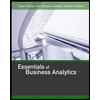Consider two possible investments whose payoffs are completely independent of one another. Both investments have the same expected value and standard deviation. If you have $1,000 to invest, could you benefit from dividing your funds between these investments? Explain your answer. a) Yes. By dividing your funds, you are adding combinations of possible payoffs that lie between the worst- and best-case scenarios and so the probability-weighted spread of the possible payoffs is smaller. The variance of the payoffs is halved. b) Yes. Because one investment will always pay off when the other doesn't, your risk is reduced. c) No. Because the payoffs from these investments are independent and not negatively correlated, there is no benefit. d) No. Usually diversification helps to spread risk, but in this case, because the investments have the same expected value and standard deviation there is no benefit.
Consider two possible investments whose payoffs are completely independent of one another. Both investments have the same expected value and standard deviation. If you have $1,000 to invest, could you benefit from dividing your funds between these investments? Explain your answer. a) Yes. By dividing your funds, you are adding combinations of possible payoffs that lie between the worst- and best-case scenarios and so the probability-weighted spread of the possible payoffs is smaller. The variance of the payoffs is halved. b) Yes. Because one investment will always pay off when the other doesn't, your risk is reduced. c) No. Because the payoffs from these investments are independent and not negatively correlated, there is no benefit. d) No. Usually diversification helps to spread risk, but in this case, because the investments have the same expected value and standard deviation there is no benefit.
Essentials of Business Analytics (MindTap Course List)
2nd Edition
ISBN:9781305627734
Author:Jeffrey D. Camm, James J. Cochran, Michael J. Fry, Jeffrey W. Ohlmann, David R. Anderson
Publisher:Jeffrey D. Camm, James J. Cochran, Michael J. Fry, Jeffrey W. Ohlmann, David R. Anderson
Chapter15: Decision Analysis
Section: Chapter Questions
Problem 19P: A firm has three investment alternatives. Payoffs are in thousands of dollars. a. Using the expected...
Related questions
Question

Transcribed Image Text:Consider two possible investments whose payoffs are completely independent of one another. Both investments have the
same expected value and standard deviation. If you have $1,000 to invest, could you benefit from dividing your funds
between these investments? Explain your answer.
a) Yes. By dividing your funds, you are adding combinations of possible payoffs that lie between the worst- and best-case
scenarios and so the probability-weighted spread of the possible payoffs is smaller. The variance of the payoffs is halved.
b) Yes. Because one investment will always pay off when the other doesn't, your risk is reduced.
c) No. Because the payoffs from these investments are independent and not negatively correlated, there is no benefit.
d) No. Usually diversification helps to spread risk, but in this case, because the investments have the same expected value
and standard deviation there is no benefit.
Expert Solution
This question has been solved!
Explore an expertly crafted, step-by-step solution for a thorough understanding of key concepts.
This is a popular solution!
Trending now
This is a popular solution!
Step by step
Solved in 3 steps

Knowledge Booster
Learn more about
Need a deep-dive on the concept behind this application? Look no further. Learn more about this topic, finance and related others by exploring similar questions and additional content below.Recommended textbooks for you

Essentials of Business Analytics (MindTap Course …
Statistics
ISBN:
9781305627734
Author:
Jeffrey D. Camm, James J. Cochran, Michael J. Fry, Jeffrey W. Ohlmann, David R. Anderson
Publisher:
Cengage Learning

Principles of Accounting Volume 2
Accounting
ISBN:
9781947172609
Author:
OpenStax
Publisher:
OpenStax College

Pfin (with Mindtap, 1 Term Printed Access Card) (…
Finance
ISBN:
9780357033609
Author:
Randall Billingsley, Lawrence J. Gitman, Michael D. Joehnk
Publisher:
Cengage Learning

Essentials of Business Analytics (MindTap Course …
Statistics
ISBN:
9781305627734
Author:
Jeffrey D. Camm, James J. Cochran, Michael J. Fry, Jeffrey W. Ohlmann, David R. Anderson
Publisher:
Cengage Learning

Principles of Accounting Volume 2
Accounting
ISBN:
9781947172609
Author:
OpenStax
Publisher:
OpenStax College

Pfin (with Mindtap, 1 Term Printed Access Card) (…
Finance
ISBN:
9780357033609
Author:
Randall Billingsley, Lawrence J. Gitman, Michael D. Joehnk
Publisher:
Cengage Learning